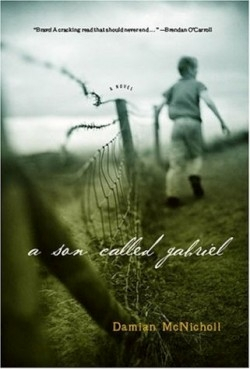A Son Called Gabriel
In the 1970s, the “troubles” were coming to a filthy head in Ulster. Bloody Sunday was a recent, open wound, slowly grinding down the ability of Catholics and Protestants to co-exist peacefully. Protestants were being awarded most of the high-paying government jobs, while Catholics struggled to squeak out livings as farmers, living in homes without electricity or running water. Amidst this tumultuous power struggle, young Gabriel Harkin, the protagonist in this novel, succumbs to a power struggle of his own, and admits that he’s gay.
It’s significant realization for any boy, more significant for Gabriel since his sexual confusion is tightly wrapped with a hearty layer of Irish-Catholic guilt. In Gabriel’s world, his mother attends daily Mass and cleanly divides most mistakes between mortal sins (lying) and “mortal, mortal sins” (using birth control, being gay).
It’s a black-and-white existence with little room for gray, which fuels Gabriel’s angst when he just can’t seem to get excited about girls. He fools around with Lizzie, a fast-moving girl he met at a local dance, but “it was nerve-wracking being with her because I felt nothing sexual. My thing never stirred.” With Connor, it “turned hard as oak whenever he touched me. That preyed on my mind because there was no denying it.” Gabriel’s struggle to deny his feelings so he can meet the expectations of his religion and culture is poignant and beautifully developed by the author, an ex-lawyer who grew up in Northern Ireland and drew from his own experiences to write this first novel.
While Gabriel’s sexual identity isn’t kept secret from readers—in the first chapters of the book he admires the body of an athletic man on the beach and picks his favorite professional soccer team based on the color of their shorts—the Harkin family is holding something else close to their chests: the murky past of Uncle Brendan, a priest. While heavy-handed hints are dribbled out through the novel, they only succeed in reducing the boom of revealing the family secret to a bit of a narrative bust.
It’s the finely drawn characters that prevent the clumsy revelation from dampening enthusiasm for the book. Gabriel’s father, a coarse, drink-every-Saturday-night-with-the-boys kind of man, is sometimes harsh, and other times soft, as he relates to his delicate, manual labor-averse eldest son. Grandmother Harkin can be overemotional, crying because Brendan hasn’t been home in years, but in a poignantly funny scene is given rounder dimension as she relieves her bladder atop her prized rhubarb plants. Each character, from Gabriel’s “girlfriend” to his youngest sister Nuala, is so vividly portrayed that their world is all-encompassing, and it becomes almost heartbreaking to say goodbye.
Disclosure: This article is not an endorsement, but a review. The publisher of this book provided free copies of the book to have their book reviewed by a professional reviewer. No fee was paid by the publisher for this review. Foreword Reviews only recommends books that we love. Foreword Magazine, Inc. is disclosing this in accordance with the Federal Trade Commission’s 16 CFR, Part 255.

